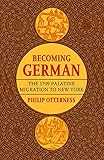Becoming German : the 1709 Palatine migration to New York / Philip Otterness.
Material type: TextPublication details: Ithaca : Cornell University Press, (c)2004.Description: 1 online resource (xiii, 235 pages) : illustrations, mapsContent type:
TextPublication details: Ithaca : Cornell University Press, (c)2004.Description: 1 online resource (xiii, 235 pages) : illustrations, mapsContent type: - text
- computer
- online resource
- 9780801471179
- Palatine Americans -- New York (State) -- History -- 18th century
- German Americans -- New York (State) -- History -- 18th century
- Immigrants -- New York (State) -- History -- 18th century
- Palatine Americans -- New York (State) -- Ethnic identity
- German Americans -- New York (State) -- Ethnic identity
- F130 .B436 2004
- COPYRIGHT NOT covered - Click this link to request copyright permission: https://lib.ciu.edu/copyright-request-form
| Item type | Current library | Collection | Call number | URL | Status | Date due | Barcode | |
|---|---|---|---|---|---|---|---|---|
 Online Book (LOGIN USING YOUR MY CIU LOGIN AND PASSWORD)
Online Book (LOGIN USING YOUR MY CIU LOGIN AND PASSWORD)
|
G. Allen Fleece Library ONLINE | Non-fiction | F130.3 (Browse shelf(Opens below)) | Link to resource | Available | ocn865508950 |
Includes bibliographies and index.
1. "A particularly deceptive spirit": The German southwest, 1709 -- 2. "The poor Palatine refugees": London, spring-summer 1709 -- 3. "A parcel of vagabonds": London, summer-winter 1709 -- 4. "A deplorable sickly condition": New York City, 1710 -- 5. "They will not listen to tar making": the Hudson Valley, 1710-1712 -- 6. "The promis'd land": the Schoharie Valley, 1712-1722 -- 7. "A nation which is neither French, nor English, nor Indian": The Mohawk Valley, 1723-1757.
"Becoming German tells the story of the largest and earliest mass movement of German-speaking immigrants to America. The so-called Palatine migration of 1709 began in the western part of the Holy Roman Empire, where perhaps as many as thirty thousand people left their homes, lured by rumors that Britain's Queen Anne would give them free passage overseas and land in America. They journeyed down the Rhine and eventually made their way to London, where they settled in refugee camps. The rumors of free passage and land proved false, but, in an attempt to clear the camps, the British government finally agreed to send about three thousand of the immigrants to New York in exchange for several years of labor.
After their arrival, the Palatines refused to work as indentured servants and eventually settled in autonomous German communities near the Iroquois of central New York."--BOOK JACKET.
COPYRIGHT NOT covered - Click this link to request copyright permission:
There are no comments on this title.
